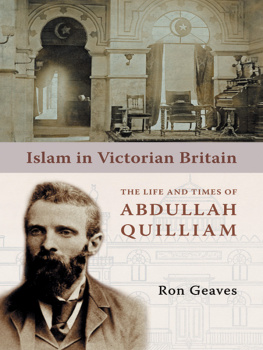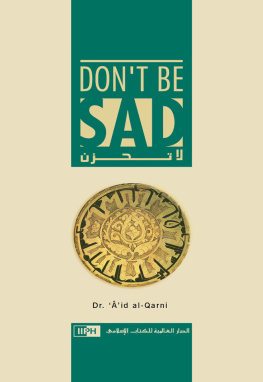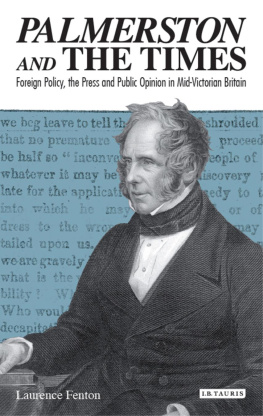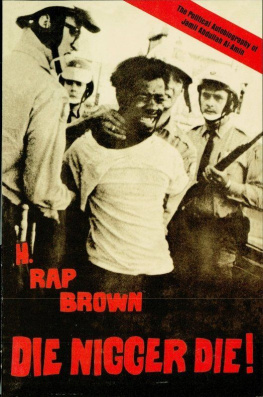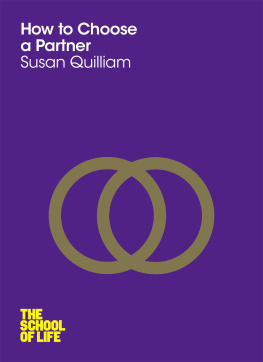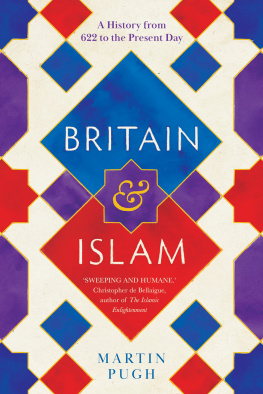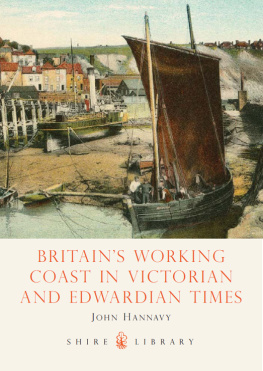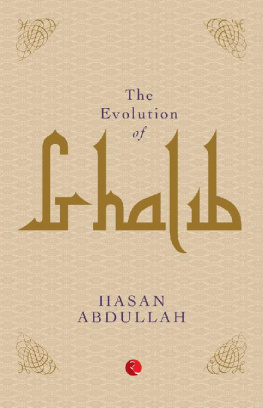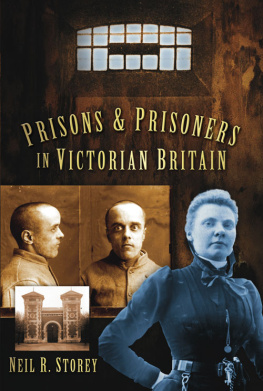Ron Geaves - Islam in Victorian Britain: The Life and Times of Abdullah Quilliam
Here you can read online Ron Geaves - Islam in Victorian Britain: The Life and Times of Abdullah Quilliam full text of the book (entire story) in english for free. Download pdf and epub, get meaning, cover and reviews about this ebook. year: 2010, publisher: Kube Publishing Ltd, genre: Religion. Description of the work, (preface) as well as reviews are available. Best literature library LitArk.com created for fans of good reading and offers a wide selection of genres:
Romance novel
Science fiction
Adventure
Detective
Science
History
Home and family
Prose
Art
Politics
Computer
Non-fiction
Religion
Business
Children
Humor
Choose a favorite category and find really read worthwhile books. Enjoy immersion in the world of imagination, feel the emotions of the characters or learn something new for yourself, make an fascinating discovery.
- Book:Islam in Victorian Britain: The Life and Times of Abdullah Quilliam
- Author:
- Publisher:Kube Publishing Ltd
- Genre:
- Year:2010
- Rating:5 / 5
- Favourites:Add to favourites
- Your mark:
- 100
- 1
- 2
- 3
- 4
- 5
Islam in Victorian Britain: The Life and Times of Abdullah Quilliam: summary, description and annotation
We offer to read an annotation, description, summary or preface (depends on what the author of the book "Islam in Victorian Britain: The Life and Times of Abdullah Quilliam" wrote himself). If you haven't found the necessary information about the book — write in the comments, we will try to find it.
Ron Geaves: author's other books
Who wrote Islam in Victorian Britain: The Life and Times of Abdullah Quilliam? Find out the surname, the name of the author of the book and a list of all author's works by series.
Islam in Victorian Britain: The Life and Times of Abdullah Quilliam — read online for free the complete book (whole text) full work
Below is the text of the book, divided by pages. System saving the place of the last page read, allows you to conveniently read the book "Islam in Victorian Britain: The Life and Times of Abdullah Quilliam" online for free, without having to search again every time where you left off. Put a bookmark, and you can go to the page where you finished reading at any time.
Font size:
Interval:
Bookmark:
First published in England by Kube Publishing Ltd,
Markfield Conference Centre
Ratby Lane, Markfield,
Leicestershire LE67 9SY
United Kingdom
Tel: +44 (0) 1530 249230
Fax: +44 (0) 1530 249656
Website: www.kubepublishing.com
Email:
Ron Geaves, 2010
All rights reserved
The right of Ron Geaves to be identified
as the author of this work has been
asserted by him in accordance with the
Copyright, Designs and Patents Act, 1988.
Photographic credits: British Library:p. 110; Liverpool Record Office,
Liverpool Libraries: front and back covers, pp.21, 32, 77, 91, 137;
Ron Geaves: pp.272, 285; : p.252
British Library Cataloguing-in-Publication Data
Geaves, Ron.
Islam in Victorian Britain : the life and times of Abdullah Quilliam
1. Quilliam, Abdullah 2. Muslim converts from ChristianityGreat BritainBiography 3. IslamGreat BritainHistory19th century
I. Title
297.092
ISBN 978-1-84774-003-8 casebound
ISBN 978-1-84774-010-6 paperback
Cover Design: Nasir Cadir
Typesetting: Naiem Qaddoura
A book of this kind involves a considerable debt to a large number of people who have assisted in so many ways. First I have to acknowledge the almost limitless patience of my wife Catherine who put up with the long hours in my study. She accompanied me on the journey to do research at the museum on the Isle of Man with great sacrifice, for she is no sailor! I also thank my son Dominic who at the age of six does not share his mothers forbearance, and demanded that Daddy stopped being boring and came out to play.
There is a very long list of those who have supported the research. My thanks go to Dollin Kelly, the writer of The New Manx Worthies, who helped me find my way around the archives on the Isle of Man and who engaged me in many a stimulating conversation about Quilliam. In this regard, I also want to thank the staff at the Isle of Man Museum, who were so helpful in assisting me with requests for documents. I also acknowledge my indebtedness to Martin Moir and his wife who provided the means to access confidential government files and even shared in the expense of this exercise. I thank also the various members of the Abdullah Quilliam Society for their support and access to various documents that they have collected. In particular, I am indebted to them for access to the first registered mosque in Britain on the day that Muslims prayed inside for the first time in over one hundred years. I pray that all their plans come to fruition. There are so many Muslim scholars and academics who have shared with me selflessly their knowledge of Abdullah Quilliam or the background history of nineteenth-century Islam in Britain. I thank Sophie Gilliat-Ray at Cardiff, Tim Winter at Cambridge, and Muhammad Seddon and Sadek Hamid at Chester, in particular, but there were so many others who approached me at conferences or seminars with nuggets of information.
Abdullah Quilliam has also attracted considerable interest from some British Muslims who have been fascinated by his life. Many have been excited by this venture and have communicated with me. Some have provided invaluable information from their own extensive investigations and others have offered me the support to complete the project by sharing their passion and encouragement with me. In this regard I acknowledge my debt to the kindness of Richard Cain who shared his passion for Quilliam with me and permitted access to the treasure trove of documents that he has collected over the years. I will remember the magical moment of discovering those four large boxes waiting for me on his floor.
Finally, but not least, I thank the undoubted skills of Yahya Birt, a patient and thorough editor and one who is not least amongst the scholars of Quilliam and British Muslims himself, as well as to record my gratitude to Kube Publishings reader who offered many helpful insights. Liverpool Hope University deserves a mention too for providing the facilities and the support for me to research this book.
There are probably many I have forgotten to acknowledge. I recognise their assistance and apologise for overlooking them.
Look out, for I will be back to you all, for, God willing, I havent finished with Sheikh Abdullah Quilliam yet nor him with me. There has been a wonderful serendipity at work in this project, so beyond all else I thank the power that has offered me such a wonderful opportunity.
Ron Geaves
January 2010
CHAPTER 1
O n the 28th July 1902, 1,000 Indian troops arrived in the city of Liverpool on a steamship from Bombay. They were en route to London to take part in the Coronation celebrations of Edward VII. The City Corporation took advantage of their presence to organise a parade through the city centre and to host a civic reception that evening at St. Georges Hall, the newly-built showpiece declaring Liverpools status as the second city of the British Empire and displaying the grandeur of the new municipality. The Indian troops took their seats in orderly and disciplined rows dressed in the splendour of their regiments. The hall was packed with civic dignitaries, members of the public who had managed to obtain seats and representatives of the press. An Englishman entered, dressed in the traditional robes and turban of an Ottoman alim. Five hundred of the soldiers stood and shouted, Allahu Akbar. As the takbir resounded around this most English of venues, the man took his seat amongst the official guests. One of the many remarkable things about this incident is that the Indian Muslim sepoys knew exactly who had entered the hall, and were prepared to break ranks to show their respect. An extraordinary life lies behind this one incident, and there are many significant reasons why this should be told, particularly at a time when Muslims in Britain experience considerable challenges concerning their loyalty, identity and citizenship, and when the survival of the British brand of multiculturalism is itself under pressure.
At a time when the British Empire was at its zenith and very few Muslim nations remained free from European domination, one man took it upon himself to promote Islam in the heart of historys greatest colonial enterprise. Fully believing in the truth of the revelation that the Prophet Muhammad received and passionate in his conviction that Islam, a religion that he described as being fully conversant with reason, he succeeded in converting more than 500 British men and women to Islam. For a period of fifteen years, he was rarely out of the media in Liverpool, the Isle of Man, the northwest of England and even nationally and internationally.
On the 29th July 1893, the Manchester Clarion reported (in the terminology of the day) that a Muhammaden mission in Liverpool was making converts amongst educated Englishmen. The article described a movement called the Liverpool Muslim Institute, and seemed to be astonished at the idea that a mosque should open every day for prayers in a busy English seaport. The reporter was surprised at the turning of the tables, the idea that the East was actually engaged in trying to convert the West. He stated that the honorary secretary distributed explanatory works on Islam and that tracts are scattered about on the premises, sowing the seeds of a new religion in the conventional missionary manner, which we, for other use, invented.
The missionary theme also appeared in an otherwise informative article that was printed in the Sunday Telegraph three years later. The article deserves to be set out in full and will be used to introduce readers to the subject of this biography. The article appeared under the headline, A Mosque in Liverpool where Britons pray to Allah, and read as follows:
Font size:
Interval:
Bookmark:
Similar books «Islam in Victorian Britain: The Life and Times of Abdullah Quilliam»
Look at similar books to Islam in Victorian Britain: The Life and Times of Abdullah Quilliam. We have selected literature similar in name and meaning in the hope of providing readers with more options to find new, interesting, not yet read works.
Discussion, reviews of the book Islam in Victorian Britain: The Life and Times of Abdullah Quilliam and just readers' own opinions. Leave your comments, write what you think about the work, its meaning or the main characters. Specify what exactly you liked and what you didn't like, and why you think so.

